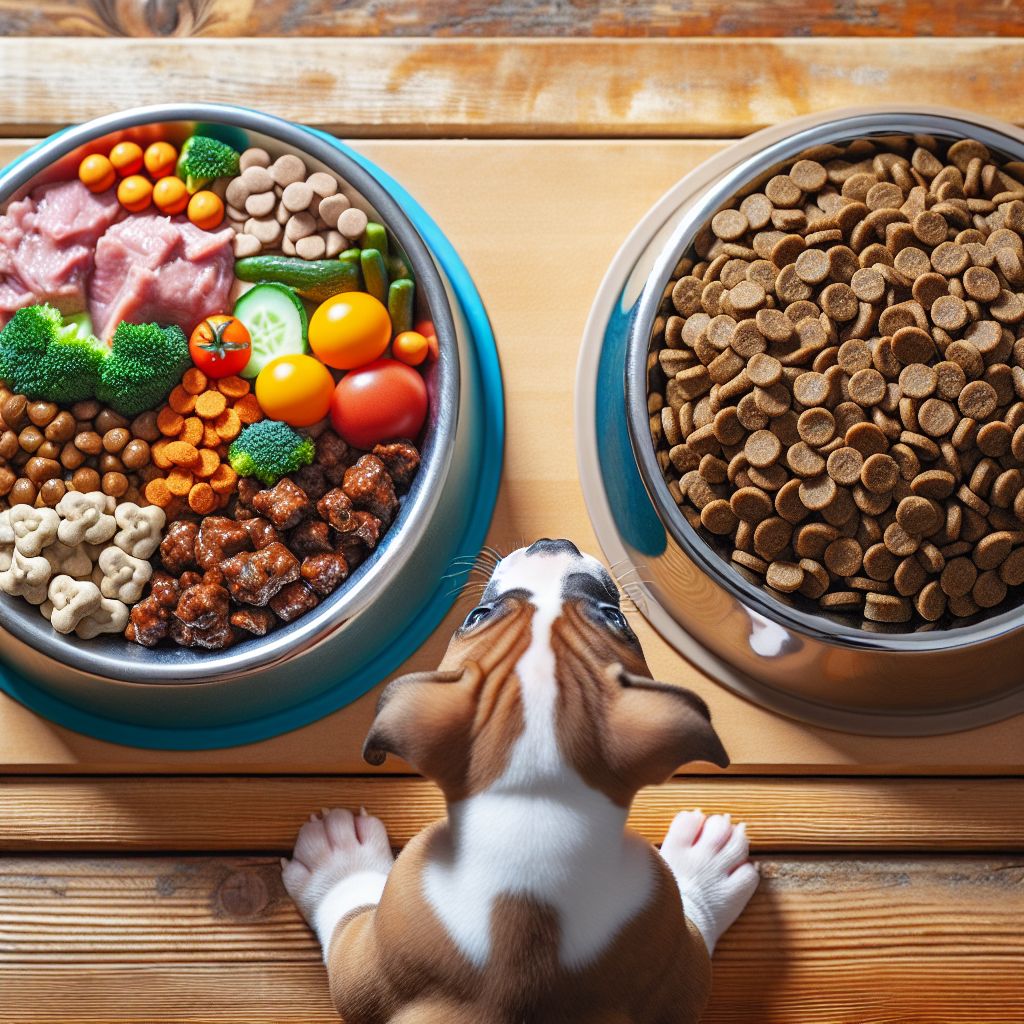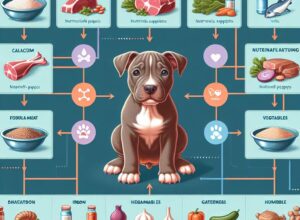
Key Takeaways
- Pitbull puppies require a diet rich in protein, fats, and specific vitamins and minerals for optimal growth.
- Homemade puppy food allows for customization but requires a careful balance to ensure nutritional completeness.
- Store-bought food is convenient and often fortified with essential nutrients specific to a pitbull puppy’s developmental needs.
- It’s crucial to understand the ingredients and nutritional information on dog food labels to make informed decisions.
- Feeding your pitbull puppy a mix of homemade and store-bought food can be beneficial, but it’s important to transition diets safely.
Pitbull Puppy Nutrition: What Your Pup Really Needs
Feeding your pitbull puppy isn’t just about satisfying their hunger; it’s about fueling their growth and setting the stage for a healthy life. Pitbull puppies, like all growing dogs, need a balanced diet rich in the right nutrients. Most importantly, they need high-quality protein to build strong muscles, fats for energy, and a range of vitamins and minerals to support their rapid development.
Key Nutrients for Growing Pitbull Puppies
When selecting the best food for your pitbull puppy, there are several key nutrients to focus on:
- Protein: Essential for muscle and tissue growth. Look for foods with a high percentage of meat-based protein.
- Fats: Provide energy and help with brain development. Sources like fish oil also offer omega-3 fatty acids, which are beneficial for skin and coat health.
- Calcium and Phosphorus: These minerals are vital for strong bone development and should be in the correct ratio to prevent growth abnormalities.
- DHA: An omega-3 fatty acid important for cognitive development.
- Vitamins A, E, and C: Important antioxidants that support the immune system.
Besides these nutrients, a pitbull puppy’s diet should also include a balance of carbohydrates for energy and fiber for digestive health.
The Importance of Tailored Diets for Different Breeds
“Pit Bull Strength and Muscle Naturally” from www.emotionalpetsupport.com
Pitbull puppies are a unique breed with specific dietary needs. Because they grow into muscular dogs with high energy levels, their food needs to support their body structure and activity levels. This is why it’s essential to choose a diet formulated specifically for medium to large breeds, as it will cater to their growth patterns and help prevent joint issues later in life.
The Homemade Route: Crafting Your Puppy’s Meal
Some owners opt for homemade puppy food, which can be a great way to control exactly what goes into your pitbull’s diet. When done correctly, homemade meals can be nutritious and tailored to your puppy’s taste.
Creating a Balanced Diet from Scratch
- Start with high-quality proteins like lean meats, poultry, or fish.
- Include a variety of vegetables for vitamins and minerals.
- Add a source of carbohydrates, such as brown rice or sweet potatoes, for energy.
- Remember to include a source of calcium, like finely ground eggshells or a supplement.
- Consult with a veterinarian or a canine nutritionist to ensure your homemade diet meets all of your puppy’s nutritional needs.
Remember, while variety is the spice of life, consistency is key to your puppy’s diet. Any changes to their meals should be introduced gradually to avoid upsetting their stomach.
Common Homemade Food Ingredients to Use
Here are some ingredients that can be part of a balanced homemade meal for your pitbull puppy:
- Lean ground beef or turkey
- Chicken breasts or thighs
- Salmon or other oily fish for omega-3s
- Carrots, peas, and spinach
- Brown rice, quinoa, or oatmeal
Always cook meats thoroughly and avoid adding any seasonings or foods that are toxic to dogs, like onions, garlic, and chocolate.
Pros and Cons of Homemade Puppy Food
Making your own dog food comes with its set of advantages and challenges:
Pros:
- You have full control over the quality and sources of ingredients.
- Homemade food can be free from preservatives and fillers found in some commercial foods.
- It allows for customization for picky eaters or those with specific dietary needs.
Cons:
- It can be time-consuming to prepare balanced meals regularly.
- Homemade diets may lack essential nutrients if not properly formulated.
- It requires a commitment to learning about canine nutrition and possibly consulting with experts.
Therefore, if you choose to feed your pitbull puppy homemade food, you must be diligent in research and preparation. It’s not as simple as sharing your dinner plate; it’s about crafting a meal that supports their growth and health.
When it comes to store-bought options, convenience is a major perk. These foods are specifically formulated to meet all of a growing puppy’s nutritional requirements. However, not all store-bought foods are created equal, and it’s important to know what to look for to ensure you’re providing the best for your pitbull puppy.
Store-Bought Simplicity: Commercial Diets for Your Pitbull
Commercial diets offer a range of options for pitbull puppy owners. From dry kibble to wet food, the choices can be overwhelming. But with a few guidelines, you can navigate the shelves like a pro.
Decoding the Labels: What to Look For
Understanding dog food labels is crucial in choosing the right food for your pitbull puppy. Here’s what to keep an eye on:
- Named protein source: Look for a label that lists a specific type of meat (like chicken or beef) as the first ingredient.
- Meat meal: A concentrated form of protein, meat meal can be a beneficial ingredient, provided it’s from a named source (e.g., chicken meal, not just ‘meat meal’).
- Whole grains and vegetables: These provide essential vitamins, minerals, and fiber. However, be cautious with grains if your puppy has a sensitivity.
- No fillers or by-products: Low-quality ingredients can compromise your puppy’s diet and are best avoided.
- AAFCO statement: Ensure the food meets the nutritional levels established by the AAFCO for growth or all life stages.
Remember, the ingredient list is ordered by weight, so the first few ingredients are what the food mostly consists of. This is where you want to see high-quality protein sources.
Catering to a Pitbull’s Physique: Specialized Formulas
Pitbull puppies will grow to be strong and muscular, so it’s essential to select a food that supports this development. Many brands offer formulas designed for medium to large-breed puppies, which are ideal for pit bulls. These formulas typically contain:
- Optimal levels of protein and fat for muscle and skeletal growth
- Added DHA for brain and vision development
- Appropriate levels of calcium and phosphorus for bone health
Choosing a specialized formula can take the guesswork out of making sure your puppy’s nutritional needs are met.
Comparing Top Store-Bought Brands for Pitbull Puppies
Let’s look at some of the top store-bought options for pitbull puppies:
| Brand | Protein Source | Special Features | AAFCO Approved |
| Blue Buffalo Wilderness Puppy | Deboned Chicken, Chicken Meal | Grain-free, high-protein | Yes |
| Wellness CORE Puppy | Deboned Turkey, Chicken Meal | Grain-free, DHA-enriched | Yes |
| Royal Canin Medium Puppy | Chicken By-Product Meal | Antioxidant complex, tailored kibble size | Yes |
Homemade vs. Store-Bought: The Showdown
As a pitbull puppy owner, you’re faced with a choice: whip up a batch of homemade meals or pick up a bag of commercial food. Both have their merits, but it’s essential to weigh the pros and cons to decide what’s best for your furry friend.
Nutritional Balance: Which Method Delivers?
Homemade diets can be nutritionally balanced if they’re carefully planned. However, it’s not uncommon for home-prepared diets to lack certain nutrients, which can lead to health problems down the line. Store-bought foods, on the other hand, are formulated to meet all of a puppy’s nutritional needs as stipulated by the AAFCO. With store-bought food, you’re less likely to encounter nutritional gaps.
But remember, not all store-bought foods are created equal. It’s crucial to choose a high-quality brand that prioritizes natural, whole-food ingredients without unnecessary fillers or additives.
- Homemade food requires a good understanding of your puppy’s nutritional needs and must be balanced with the right supplements.
- Store-bought food is designed to be complete and balanced, making it a safer bet for those unsure about homemade meal planning.
Cost Comparison: Where You Can Save
When it comes to cost, making your dog’s food at home can potentially be less expensive in the long run, particularly if you purchase ingredients in bulk or select seasonal produce. However, the cost-effectiveness of homemade dog food varies significantly based on the ingredients and their quality, and where you buy them. It’s important to include the cost of supplements to ensure the diet is nutritionally complete, as this can affect overall expenses.
Store-bought food, while appearing pricier upfront, provides substantial value in terms of convenience and nutritional assurance. The research that goes into formulating these diets guarantees they meet all your puppy’s dietary needs. Typically, high-quality store-bought puppy food ranges from $30 to $80 per month, influenced by factors like the brand and your puppy’s size.
Both options have their merits: homemade food offers potential savings but requires careful nutritional planning and time commitment. Store-bought food offers peace of mind with its pre-formulated nutritional completeness, reflecting its cost. Consulting with a veterinarian or a veterinary nutritionist can help determine the most cost-effective and appropriate option for feeding your puppy.
Time and Convenience: Assessing the Trade-offs
Time is a valuable commodity, and preparing homemade meals can be time-consuming. If you’re juggling a busy schedule, store-bought food is the clear winner for convenience. Just scoop and serve!
But if you enjoy cooking and have time to spare, making your puppy’s meals can be a rewarding experience. It also allows you to bond with your pet through food.
Health Outcomes: Long-Term Effects on Your Pitbull Puppy
Take the story of Max, a pitbull puppy whose owner decided to switch from a store-bought diet to a homemade one. At first, Max thrived, but over time he developed signs of nutritional deficiencies. A visit to the vet revealed that Max’s homemade diet was lacking in essential amino acids and minerals. With guidance from a veterinary nutritionist, Max’s owner was able to adjust the homemade diet to better meet his needs.
This example underscores the importance of getting it right when feeding your pitbull puppy. Whether you choose homemade or store-bought food, always monitor your puppy’s health and consult with your vet to ensure their dietary needs are being met.
Pitbull Puppy Diets in Practice: Real-World Owner Insights
Real-life experiences from other pitbull puppy owners can offer valuable insights into the homemade vs. store-bought debate. Let’s dive into some success stories on both sides of the fence.
Case Studies: Success Stories on Both Sides
Luna’s owner found success with a store-bought diet that catered to her high energy levels and supported her muscle growth. On the flip side, Rocky’s owner chose a homemade diet that cleared up his skin allergies and improved his digestion.
Both Luna and Rocky are thriving, proving that there’s no one-size-fits-all answer. The key is to tailor the diet to your puppy’s individual needs and consult with your vet for guidance.
Transitioning Between Diets: How to Do It Safely
When transitioning your pitbull puppy from one type of food to another, it’s critical to do so gradually. A sudden change in diet can lead to gastrointestinal upset. Start by mixing a small amount of the new food with the old, and slowly increase the proportion over the course of a week.
This method helps your puppy’s digestive system adjust and can prevent any adverse reactions. Always observe your puppy’s response to the new diet and consult with your vet if you notice any concerning signs.
Paw-licking Good: Top Recipes and Recommendations
Now, let’s get to the fun part: feeding your pitbull puppy a diet that’s both nutritious and delicious.
Homemade Meal Plans for Your Pitbull Puppy
Here are a couple of homemade recipes that can serve as a starting point for your puppy’s diet:
- Chicken and Rice Delight: Combine cooked, boneless chicken, brown rice, and steamed carrots for a simple yet balanced meal.
- Beefy Veggie Mix: Mix ground beef, cooked quinoa, and a medley of veggies like spinach and sweet potatoes for a nutrient-packed dinner.
Always consult with a professional to ensure these meals meet your puppy’s dietary requirements, and remember to add appropriate supplements as needed.
Ultimate Store-Bought Food List: Puppy-Approved Choices
For those leaning towards the convenience of store-bought food, here are some top picks that pitbull puppy owners rave about:
- Blue Buffalo Wilderness High Protein Puppy Food
- Wellness CORE Natural Grain Free Dry Dog Food Puppy
- Canidae Grain Free PURE Foundations Puppy Formula
These brands are known for their high-quality ingredients and comprehensive nutrition profiles, making them excellent choices for your growing pitbull puppy.
FAQs
Let’s address some common questions that pitbull puppy owners have when it comes to feeding their pets.
How Much Should I Feed My Pitbull Puppy?
The amount you feed your pitbull puppy will depend on their age, weight, and activity level. Start with the feeding guidelines provided by the food manufacturer, but be prepared to adjust based on your puppy’s individual needs and appetite.
Are Grain-Free Diets a Good Choice for Pitbull Puppies?
Grain-free diets can be a good choice for some puppies, especially those with grain sensitivities. However, it’s important to ensure that the diet still provides all the necessary nutrients. Some grain-free diets have been associated with heart issues in dogs, so consult with your vet before making this choice.
How Often Should Pitbull Puppies Eat?
Pitbull puppies typically need to eat three to four times a day. As they grow, you can gradually reduce the number of meals to twice daily. For more detailed information, read about how much food your Pitbull puppy needs.
Can I Mix Homemade and Store-Bought Foods?
Yes, you can mix homemade and store-bought foods to provide variety in your puppy’s diet. Just make sure the combined diet is nutritionally complete and balanced.
What Are the Signs of Dietary Allergies in Pitbull Puppies?
Signs of dietary allergies may include itching, redness, ear infections, and digestive upset. If you suspect your puppy has a food allergy, consult with your vet for an appropriate course of action. For more detailed information, you can read about the importance of a varied diet in preventing dietary issues.
Whether you choose to feed your pitbull puppy a homemade or store-bought diet, the most important thing is to ensure they’re getting the nutrition they need to grow up healthy and strong. With the right food and a little love, your pitbull puppy will thrive and be a loyal companion for years to come.



